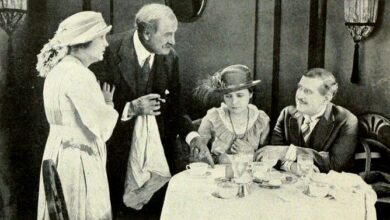
The Story of Daniel Webster by James Baldwin
Chapter V: At Exeter Academy
It was the first time that Daniel Webster had been so far from home. He was bashful and awkward. His clothes were of home-made stuff, and they were cut in the quaint style of the back-country districts.
He must have been a funny-looking fellow. No wonder that the boys laughed when they saw him going up to the principal to be examined for admission.
The principal of the academy at that time was Dr. Benjamin Abbott. He was a great scholar and a very dignified gentleman.
He looked down at the slender, black-eyed boy and asked:
“What is your age, sir?”
“Fourteen years,” said Daniel.
“I will examine you first in reading. Take this Bible, and let me hear you read some of these verses.”
He pointed to the twenty-second chapter of Saint Luke’s Gospel.
The boy took the book and began to read. He had read this chapter a hundred times before. Indeed, there was no part of the Bible that was not familiar to him.
He read with a clearness and fervor which few men could equal.
The dignified principal was astonished. He stood as though spell-bound, listening to the rich, mellow tones of the bashful lad from among the hills.
In the case of most boys it was enough if he heard them read a verse or two. But he allowed Daniel Webster to read on until he had finished the chapter. Then he said:
“There is no need to examine you further. You are fully qualified to enter this academy.”
Most of the boys at Exeter were gentlemen’s sons. They dressed well, they had been taught fine manners, they had the speech of cultivated people.
They laughed at the awkward, new boy. They made fun of his homespun coat; they twitted him on account of his poverty; they annoyed him in a hundred ways.
Daniel felt hurt by this cruel treatment. He grieved bitterly over it in secret, but he did not resent it.
He studied hard and read much. He was soon at the head of all his classes. His schoolmates ceased laughing at him; for they saw that, with all his uncouth ways, he had more ability than any of them.
He had, as I have said, a wonderful memory. He had also a quick insight and sound judgment.
But he had had so little experience with the world, that he was not sure of his own powers. He knew that he was awkward; and this made him timid and bashful.
When it came his turn to declaim before the school, he had not the courage to do it. Long afterwards, when he had become the greatest orator of modern times, he told how hard this thing had been for him at Exeter:
“Many a piece did I commit to memory, and rehearse in my room over and over again. But when the day came, when the school collected, when my name was called and I saw all eyes turned upon my seat, I could not raise myself from it.
“Sometimes the masters frowned, sometimes they smiled. My tutor always pressed and entreated with the most winning kindness that I would venture only once; but I could not command sufficient resolution, and when the occasion was over I went home and wept tears of bitter mortification.”
Daniel stayed nine months at Exeter. In those nine months he did as much as the other boys of his age could do in two years.
He mastered arithmetic, geography, grammar, and rhetoric. He also began the study of Latin. Besides this, he was a great reader of all kinds of books, and he added something every day to his general stock of knowledge.
His teachers did not oblige him to follow a graded course of study. They did not hold him back with the duller pupils of his class. They did not oblige him to wait until the end of the year before he could be promoted or could begin the study of a new subject.
But they encouraged him to do his best. As soon as he had finished one subject, he advanced to a more difficult one.
More than fifty years afterwards, Dr. Abbott declared that in all his long experience he had never known any one whose power of gaining knowledge was at all equal to that of the bashful country lad from the New Hampshire hills.
Judge Webster would have been glad to let Daniel stay at Exeter until he had finished the studies required at the academy. But he could not afford the expense.
If he should spend all his money to keep the boy at the academy, how could he afterwards find the means to send him to college where the expenses would be much greater?
So he thought it best to find a private teacher for the boy. This would be cheaper.
Chapter VI: Getting Ready for College
One day in the early winter, Judge Webster asked Daniel to ride with him to Boscawen. Boscawen was a little town, six miles away, where they sometimes went for business or for pleasure.
Snow was on the ground. Father and son rode together in a little, old-fashioned sleigh; and as they rode, they talked about many things. Just as they were going up the last hill, Judge Webster said:
“Daniel, do you know the Rev. Samuel Wood, here in Boscawen?”
“I have heard of him,” said Daniel. “He takes boys into his family, and gets them ready for college.”
“Yes, and he does it cheap, too,” said his father. “He charges only a dollar a week for board and tuition, fuel and lights and everything.”
“But they say he is a fine teacher,” said Daniel. “His boys never fail in the college examinations.”
“That is what I have heard, too,” answered his father. “And now, Dannie, I may as well tell you a secret. For the last six years I have been planning to have you take a course in Dartmouth College. I want you to stay with Dr. Wood this winter, and he will get you ready to enter. We might as well go and see him now.”
This was the first time that Daniel had ever heard his father speak of sending him to college. His heart was so full that he could not say a word. But the tears came in his eyes as he looked up into the judge’s stern, kind face.
He knew that if his father carried out this plan, it would cost a great deal of money; and if this money should be spent for him, then the rest of the family would have to deny themselves of many comforts which they might otherwise have.
“Oh, never mind that, Dan,” said his brother Ezekiel. “We are never so happy as when we are doing something for you. And we know that you will do something for us, some time.”
And so the boy spent the winter in Boscawen with Dr. Wood. He learned everything very easily, but he was not as close a student as he had been at Exeter.
He was very fond of sport. He liked to go fishing. And sometimes, when the weather was fine, his studies were sadly neglected.
There was a circulating library in Boscawen, and Daniel read every book that was in it. Sometimes he slighted his Latin for the sake of giving more time to such reading.
One of the books in the library was Don Quixote. Daniel thought it the most wonderful story in existence. He afterwards said:
“I began to read it, and it is literally true that I never closed my eyes until I had finished it, so great was the power of this extraordinary book on my imagination.”
But it was so easy for the boy to learn, that he made very rapid progress in all his studies. In less than a year, Dr. Wood declared that he was ready for college.
He was then fifteen years old. He had a pretty thorough knowledge of arithmetic; but he had never studied algebra or geometry. In Latin he had read four of Cicero’s orations, and six books of Virgil’s Aeneid. He knew something of the elements of Greek grammar, and had read a portion of the Greek Testament.
Nowadays, a young man could hardly enter even a third-rate college without a better preparation than that. But colleges are much more thorough than they were a hundred years ago.
Chapter VII: At Dartmouth College
Dartmouth College is at Hanover, New Hampshire. It is one of the oldest colleges in America and among its students have been many of the foremost men of New England.
It was in the fall of 1797, that Daniel Webster entered this college.
He was then a tall, slender youth, with high cheek bones and a swarthy skin.
The professors soon saw that he was no common lad. They said to one another, “This young Webster will one day be a greater man than any of us.”
And young Webster was well-behaved and studious at college. He was as fond of sport as any of the students, but he never gave himself up to boyish pranks.
He was punctual and regular in all his classes. He was as great a reader as ever.
He could learn anything that he tried. No other young man had a broader knowledge of things than he.
And yet he did not make his mark as a student in the prescribed branches of study. He could not confine himself to the narrow routine of the college course.
He did not, as at Exeter, push his way quickly to the head of his class. He won no prizes. “But he minded his own business,” said one of the professors. “As steady as the sun, he pursued, with intense application, the great object for which he came to college.”
Soon everybody began to appreciate his scholarship. Everybody admired him for his manliness and good common sense.
“He was looked upon as being so far in advance of any one else, that no other student of his class was ever spoken of as second to him.”
He very soon lost that bashfulness which had troubled him so much at Exeter. It was no task now for him to stand up and declaim before the professors and students.
In a short time he became known as the best writer and speaker in the college. Indeed, he loved to speak; and the other students were always pleased to listen to him.
One of his classmates tells us how he prepared his speeches. He says: “It was Webster’s custom to arrange his thoughts in his mind while he was in his room, or while he was walking alone. Then he would put them upon paper just before the exercise was to be called for.
“If he was to speak at two o’clock, he would often begin to write after dinner; and when the bell rang he would fold his paper, put it in his pocket, go in, and speak with great ease.
“In his movements he was slow and deliberate, except when his feelings were aroused. Then his whole soul would kindle into a flame.”
In the year 1800, he was chosen to deliver the Fourth of July address to the students of the college and the citizens of the town. He was then eighteen years old.
The speech was a long one. It was full of the love of country. Its tone throughout was earnest and thoughtful.
But in its style it was overdone; it was full of pretentious expressions; it lacked the simplicity and good common sense that should mark all public addresses.
And yet, as the speech of so young a man, it was a very able effort. People said that it was the promise of much greater things. And they were right.
In the summer of 1801, Daniel graduated. But he took no honors. He was not even present at the Commencement.
His friends were grieved that he had not been chosen to deliver the valedictory address. Perhaps he also was disappointed. But the professors had thought best to give that honor to another student.




